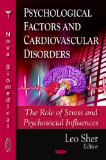Psychological Factors and Cardiovascular Disorders: The Role of Stress and Psychosocial Influences

Psychological factors significantly affect the cardiovascular system and play an important role in the etiopathogenesis of cardiovascular disorders. For the past several decades attention to the psychosocial and behavioral factors in cardiovascular disease has increased significantly. Multiple lines of evidence suggest that psychosocial factors contribute significantly to coronary heart disease as evidenced by data relating risk to depression, anxiety, personality factors and character traits, social isolation, and chronic life stress. When psychosocial stresses tend to cluster together, risk for cardiac events is often substantially elevated, equaling or exceeding that associated with standard biomedical risk factors for coronary disease such as hypertension and hypercholesterolemia. Understanding the integration of the interactions among multiple psychological and biological factors in the regulation of the cardiovascular system and the development of cardiovascular disorders is an important challenge for future research. This book will contribute to this goal. The contributors to this book are the leading international experts in the field of the relation between psychological processes and cardiovascular disorders. This book will be of interest to physicians, psychologists, mental health counselors, other clinicians, medical and psychology students, medical residents, and the general public.
Publisher: Nova Science Publishers
Editor:Leo Sher, M.D.
Table of Contents:
Preface
Chapter 1. Neurobehavioral functioning and cardiovascular disease.
(Patrick J. Smith and James A. Blumenthal, Dept. of Psychiatry & Behavioral Sciences, Duke University Medical Center, Durham, NC, USA)
Chapter 2. Psychological factors and the triggering of acute cardiac events.
(Viktor Èuliæ, Division of Cardiology, Department of Medicine, University Hospital Split, Split, Croatia)
Chapter 3. Spiritual influences on cardiovascular risk.
(Salvatore Giaquinto, IRCCS Rehabilitation Institute San Raffaele Pisana, Rome, Italy)
Chapter 4. Psychological risk factors in the development of hypertension.
(Mark Hamer, Dept. of Epidemiology & Public Health, University College London, London, UK)
Chapter 5. Reactive changes of cardiovascular functions due to the psycho-emotional load.
(MUDr. Eva Kellerová, Institute of Normal and Pathological Physiology, Slovak Academy of Sciences, Bratislava, Slovakia)
Chapter 6. The cardiac response of a threatened brain.
(Juan P. Sánchez-Navarro, José M. Martínez-Selva, School of Psychology, Univ. of Murcia, Murcia, Spain)
Chapter 7. Biosocial synergy: stress, cardiovascular disease, and high risk populations.
(John M. Violanti, Michael E. Andrew, Cecil M. Burchfiel, Tara A. Hartley, Erin McCanlies, School of Public Health & Health Professions, State Univ. of New York at Buffalo, Buffalo, NY, USA; National Institute for Occupational Safety and Health, Morgantown, West Virginia, USA)
Chapter 8. Cardiovascular risk as a paradigm of the negative consequences of stress at work: a “conflicting evidence.”
(Giancarlo Cesana and Cristina Menni, Univ. of Milano Bicocca, Monza, Italy)
Chapter 9. The role of self-involvement in the development of cardiovascular disease: A motivational analysis.
(Guido H.E. Gendolla, Michael Richter, Ph.D., & Kerstin Brinkmann,
Dept. of Psychology, Univ. of Geneva, Geneva, Switzerland)
Chapter 10. Drained: Studies of fatigue influence on engagement and associated cardiovascular responses.
(Rex A. Wright, Dept. of Psychology, Univ. of Alabama at Birmingham, Birmingham, USA)
Chapter 11. Indigenous views of heart, health, and disease: A medical-anthropological study.
(C. Michael Smith and Kye Nelson, Focusing Institute of New York, Spring Valley, New York, USA)
Chapter 12. Coping with psychosocial stress reflects in changes in the neuro-endocrine and cardiovascular profile of Africans.
(Leoné Malan, Wilna Oosthuyzen, Nicolaas T. Malan, Johan C. Potgieter and Yackoob K. Seedat, School for Physiology, Nutrition and Consumer Sciences and School for Psychosocial Behavioural Sciences, North-West Univ., Potchefstroom Campus, Potchefstroom, South Africa; Nelson Mandela School of Medicine, Univ. of Kwa-Zulu, Natal, South Africa)
Chapter 13. Sudden death: Neurocardiologic mystery.
(Claire M. Lathers, Paul L. Schraeder, Michael W. Bungo,
Drexel University College of Medicine. Philadelphia, USA; The Univ. of Texas Medical School, Houston, Texas, USA)
Chapter 14. Impact of cardiac rehabilitation, exercise training, and fitness on psychological distress.
(Carl J. Lavie, Richard V. Milani, Thomas J. Lavie,
Ochsner Heart and Vascular Institute, New Orleans, LA)
Chapter 15. Common presenting psychosocial problems for implantable cardioverter defibrillator patients: A primer for consulting professionals.
(Melissa Matchett, Kari Kirian, Garrett Hazelton, Jeffrey Brumfield, Samuel F. Sears, Department of Psychology, East Carolina Univ., Geenville, NC, USA)
Chapter 16. Is coronary heart disease risk underestimated in the primary care setting? The potential importance of the psychological stress assessment.
(William R. Ware, Faculty of Science, Univ. of Western Ontario, London, Ontario, Canada)
Chapter 17. Psychosocial interventions in women with coronary heart disease.
(Melanie Merswolken, Kristina Orth-Gomér, Hans-Christian Deter,
Charité, Universitätsmedizin, Campus Benjamin Franklin, Berlin, Germany; Karolinska Institute, Stockholm, Sweden)
Chapter 18. Effectiveness of musical stimulation during intracardiac catheterization.
(Heike Argstatter, Werner Haberbosch, Hans Volker Bolay
Wissenschaftliche Mitarbeiterin am Deutschen Zentrum für Musiktherapieforschung (Viktor Dulger Institut), Heidelberg, Germany)
Chapter 19. Reducing CVD with the Transcendental Meditation technique: Evidence and theory.
(Kenneth G. Walton, Maharishi University of Management Research Institute, Fairfield, Iowa, USA)
Chapter 20. Emotions and the heart.
(Leo Sher, Dept. of Psychiatry, Columbia University, New York, NY, USA)
Index
